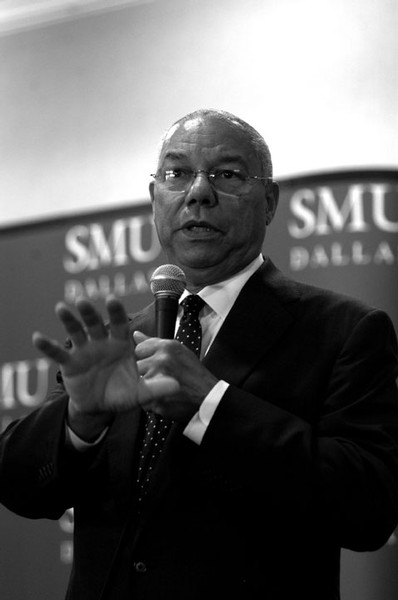
Powell kicks off Tate series (Photo by John Schreiber, The Daily Campus)
The 24th season of the Tate Lecture Series opened last night to a full house, with former Secretary of State Colin Powell as the featured speaker. Television analyst David Gergen moderated the event.
Gergen, no stranger to SMU, marked his tenth anniversary of participating in the lecture series.
Powell began by noting the generosity displayed in Texas by taking in victims of Hurricane Katrina, but said that he was “somewhat disappointed in the response.”
Gergen did ask him about the controversial claim being made by some that race was a factor in the slow response to the crisis. Powell disagreed with this assessment, but said he understood that the problem had more to do with socioeconomic class than race. He also said the people who remained in New Orleans lacked the means to evacuate.
The majority of the lecture focused on U.S. foreign policy, both in Iraq and in other parts of the world.
He said that Iraq was a challenge that the Bush administration had to deal with from the beginning. Although he admits there were source credibility problems within the intelligence community, he said the administration was concerned with Sadaam Hussein and had “every reason to believe he had weapons of mass destruction.”
Powell said going to the United Nations for support was the right move, and the President did not decide to invade until he had exhausted every diplomatic option. Powell maintains that he did not disagree with President Bush on whether or not to go to war with Hussein, but he felt that we did not have enough troops.
“When you start on a long patrol with somebody, you finish the patrol,” Powell said.
Powell did comment on the testimony he gave to the United Nations in February 2003 on the United States’ reasons for invading Iraq. The testimony about Iraq’s WMDs was proven flawed, but Powell attributes this to the sources providing intelligence and their lack of credibility.
He said he holed himself up for three days with CIA Director George Tenet, who “vouched for every single word.” He said “intelligence is never perfect,” because “the enemy is not cooperating.”
He pointed out that the people in Iraq providing information would have stopped receiving paychecks if their services were no longer needed. This proved to be an incentive for informants to continue leading the CIA on a wild goose chase for stockpiles of weapons that did not exist.
The presence of American troops in Iraq is still a necessity according to Powell. He said we now have an obligation to 25 million people, and we need to give them the stability that was promised.
He also pointed out it is important not to overlook other successes in American foreign policy that have been achieved through democracy, such as the end of the Cold War.
While he recognizes that China is still a communist state, he said they have realized that “power didn’t come out of the barrel of a gun, it came out of selling us t-shirts.”
The mood was not at all sober, and General Powell surprisingly made several jokes out of typically tedious topics like diplomacy. Students seemed to thoroughly enjoy the lecture.
Sophomore Suzy Maracine said General Powell’s arguments were “extremely well articulated.” She liked the fact that he “ doesn’t place blame on anyone,” and has an “objective point of view.”
“I think he’s a great man. I think he has a lot of integrity and commands a lot of respect,” said senior accounting major Joel Matthew.









